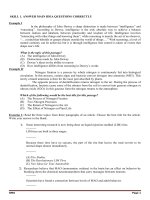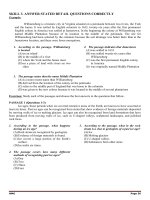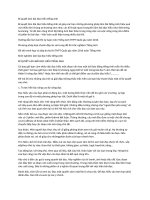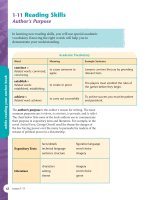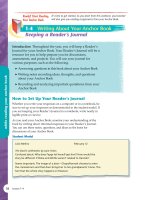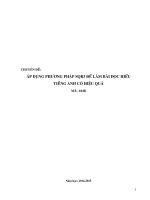Bài đọc hiểu tiếng anh
Bạn đang xem bản rút gọn của tài liệu. Xem và tải ngay bản đầy đủ của tài liệu tại đây (92.77 KB, 12 trang )
1. Hãy đọc đoạn văn sau và chọn câu trả lời tốt nhất trong số A, B, C và D.
Tomatoes are probably the most popular garden vegetable grown in the United States.
This can be attributed to their unique flavour, attractiveness, richness as a source of
vitamin C and A; and versatility as a food. The popularity of peppers can be attributed to
the same factors, although they are usually not consumed in large enough quantities to
make them an important nutritional factor in the diet.
The cultivated tomato originated in the Andes mountains of South America. It was
introduced to other areas of the world by Indians and European travelers. The first reports
of the tomato in North America was in 1710 where it was grown primarily as an
ornamental plant. Tomatoes began gaining wide acceptance as a food plant in the United
States between 1820 and 1850.
Peppers are also native to tropical America and were grown by American tribes in
both North and South America over 2,000 years ago. The small red hot peppers were
discovered by Columbus in the West Indies and introduced into Europe where they
became popular before gaining widespread acceptance in the United States, Peppers
became one of the first New World foods used commercially in Europe.
1. The topic of this passage is _______.
A. food discoveries of early Europeans
B. the nutritional value of garden vegetables
C. tomatoes and peppers
D. why tomatoes are more popular than peppers
2. According to the passage, why are peppers not an important nutritional factor in a
diet?
A. People don’t eat enough of them.
B. They lack the necessary vitamins.
C. They are less tasty than tomatoes.
D. Peppers are found in tropical climates.
3. It can be inferred from the passage that tomatoes were first used in North America
_______.
A. for food
B. as decoration
C. in place of peppers
D. for nutritional purposes
4. All of the following can be inferred from the passage about peppers EXCEPT
_______.
A. peppers became popular in the United States later than in Europe
B. peppers were bought and sold in Europe
C. red peppers are highly spiced
D. peppers originated fairly recently in North and South America
5. The word unique is closest in meaning to _______
A. unparalleled
B. special
C. peculiar
D. unified
2. Hãy đọc đoạn văn sau và chọn câu trả lời tốt nhất trong số A, B, C và D.
Excavations, or “digs” are the most important means by which archaeologists get their
information. By examining aerial photographs, old pictures, maps, documents and
landmarks, they make the decision about where a good place might be to dig. After
painstakingly removing layers of soil, often using small tools, and trowels, they look for
artifacts. This process continues until they reach an undisturbed layer of soil which has
no trace of human occupation.
Brushing away the soil that hides an artifact is like brushing away time. The tiny
fragments help to create a more complete picture of the past. Although archaeology is the
study of the remains of past human societies, it is not the same as history. Historians use
written records to find out about the past, whereas archaeologists use the objects they find
such as pots, bones, and tools to find out about the past.
1. According to the passage, all of the following help archaeologists decide where to dig
EXCEPT _______.
A. old pictures
B. maps
C. newspapers
D. aerial photographs
2. It can be inferred from the passage that archaeologists excavate an area _______
A. quickly
B. efficiently
C. slowly and carefully
D. perfectly
3. Which of the following tools would most probably be used at a dig?
A. a trowel
B. a crane
C. a large shovel
D. a dump truck
4. Which of the following layers would be the one at which archaeologists would stop
digging?
A. one with the remains of an 18th century wall
B. a layer of undisturbed soil
C. a layer containing deep cuts
D. one with the remains of Bronze Age tools
5. All of the following ‘would be something an archaeologist uses to learn about the past
EXCEPT _______.
A. a bone fragment
B. an axe from the Bronze Age
C. a letter from a war general
D. a piece of pottery
3. Hãy đọc đoạn văn sau và chọn câu trả lời tốt nhất trong số A, B, C và D.
In an effort to produce the largest, fastest, and most luxurious ship afloat, the British
built the S.S. Titanic. It was so superior to anything else on the seas that it was dubbed
‘unsinkable’. So sure of this were the owners that they provided lifeboats for only 950 of
its possible 3,500 passengers.
Many passengers were aboard the night it rammed an iceberg, only two days at sea
and more than half way between England and the New York destination. Because the
luxury liner was travelling so fast, it was impossible to avoid the ghostly looking iceberg.
An unextinguished fire also contributed to the ship’s submersion. Panic increased the
number of casualties as people jumped into the icy water or fought to be among the few
to board the lifeboats. Four hours after the mishap, another ship, the Carpathia, rescued
the survivors - less than a third of those originally abroad.
The infamous Titanic enjoyed only two days of sailing glory on its maiden voyage in
1912 before plunging into 12,000 feet of water near the coast of Newfoundland, where it
lies today.
1. Which of the following is not true?
A. Only a third of those aboard perished.
B. The Carpathia rescued the survivors.
C. The Titanic sank near Newfoundland.
D. The Titanic was the fastest ship afloat in 1912.
2. Which of the following did not contribute to the large death toll?
A. panic
B. fire
C. speed
D. Carpathia
3. How many days was the Titanic at sea before sinking?
A. 2
B. 4
C. 6
D. 8
4. The word unextinguished means most nearly the same as _______
A. indestructible
B uncontrollable
C. undiscovered
D. unquenched ^
5. In general Titanic means _______
A. gigantic
B. beautiful C. poetic
D. sweet
4. Hãy đọc đoạn văn sau và chọn câu trả lời tốt nhất trong số A, B, C và D.
What makes it rain? Rain falls from clouds for the same reason anything falls to
Earth. The Earth’s gravity pulls it. But every cloud is made of water droplets or ice
crystals. Why doesn’t rain or snow fall constantly from all clouds? The droplets or ice
crystals in cloud are exceedingly small. The effect of gravity on them is minute. Air
currents move and lift droplets so that net downward displacement is zero, even though
the droplets are in constant motion.
Droplets and ice crystals behave somewhat like dust in the air made visible in a shaft
of sunlight. To the casual observer, dust seems to act in a totally random fashion, moving
about chaotically without fixed direction. But in fact dust particles are much larger than
water droplets and they finally fall. The average size of the cloud droplet is only 0.0004
inch in diameter. It is so small that it would take sixteen hours to fall half a mile in a
perfectly still air, and it does not fall out of moving air at all. Only when the droplet
grows to a diameter of 0.008 inch or larger can it fall from the cloud. The average
raindrop contains a million times as much water as a tiny cloud droplet. The growth of a
cloud droplet to a size large enough to fall out is the cause of rain and other forms of
precipitation. This important growth process is called “coalescence”.
1. What is the main topic of the passage?
A. The mechanics of rain
B. The weather patterns of North America
C. How Earth’s gravity affects agriculture
D. Types of clouds
2. Ice crystals do not immediately fall to Earth because _______.
A. they are kept aloft by air currents
B. they combine with other chemicals in the atmosphere
C. most of them evaporate
D. their electrical charges-draw them away from the earth
3. The word random in paragraph 2 is closest in meaning to _______.
A. unpredictable
B. perplexing
C. independent
D. abnormal
4 What can be inferred about drops of water larger than 0.008 inch in diameter?
A. They never occur.
B. They are not effected by the force of gravity.
C. In still air they would fall to earth.
D. In moving air they fall at a speed of thirty-two miles per hour.
5. How much bigger is the rain drop than a cloud droplet?
A. 200 times bigger
B. 1,000 times bigger
C. 100,000 times bigger
D. 1,000.000 times bigger
5. Hãy đọc đoạn văn sau và chọn câu trả lời tốt nhất trong số A, B, C và D.
Edwin Forrest, often acknowledged as America’s first national idol of American
theatre, was born in Philadelphia in 1806. He was only 14 years old when he played
Young Norval in Home’s Douglas. He gained experience supporting Edmund Kean in
Shakespearean roles. In 1826 he established himself as one of the great tragedians of the
century with his role as Othello in a New York debut. His acting was bold and forceful,
though he was also criticized for his boasting and loud language. His violent temper did
not injure his reputation as an actor, though, and his last appearance as Richelieu in
Boston in 1871 was greeted with acclaim.
1. Which of the following statements is best supported by this passage?
A. Though Edwin Forrest was criticized, his reputation was not damaged.
B. Forrest was a great actor, but was brought down by his uncontrollable temper.
C. Though bold in his acting, in reality Forrest’s life was a tragedy.
D. Forrest became a national idol at age 14, but was ruined later.
2. Which of the following roles was NOT one that Forrest played?
A. Young Norval
B. Edmund Kean
C. Othello
D. Richelieu
C. satisfied
D. creative
3. According to the author Forrest was _______.
A. angry
B. temperamental
4 The word injure could best be replaced by which of the following?
A. support
B. damage
C. critique
D. offend
5. According to the passage, what happened in 1826?
A. New York produced a new tragedian.
B. Forrest was in a New York play.
C. Forrest made his first debut.
D. Othello became known as a great tragedy.
6. Hãy đọc đoạn văn sau và chọn câu trả lời tốt nhất trong số A, B, C và D.
We were sorry to hear about the accident. Anyway, you mustn’t feel too anxious about
work. A lot of people are away on holiday this month, so there’s not as much business as
usual. When you are feeling a little better, we’d like to come and see you; we’ll bring
some of your favourite chocolate. Now for office news. Have you heard that the boss is
getting married next month? She tried to keep it quiet but one of the secretaries heard her
talking about wedding arrangements over the phone, so now of course everyone knows!
We’re collecting money to buy her a present. It’s really difficult to know what to get her
as she had most things. Someone has suggested theatre or concert tickets, which is a good
idea. We can find out from her personal assistant what her plans are and when she has a
free evening. The only problem is that although we know what she likes, we don’t know
whether her future husband shares her tastes.
All being well, we’ll see you some time next week: Until then we all send our good
wishes and hope you recover quickly.
1. What is the writer trying to do in the text?
A. to give some cheerful news
B. to offer professional advice
C. to describe her office work
D. to suggest ways to recover
2. Why would somebody read the text?
A. to find out about a wedding present
B. to arrange to see friends
C. to learn about a person’s accident
D. to help them stop worrying
3. What does the writer suggest about one of the secretaries?
A. She’s hard-working.
B. She talks too much.
C. She likes secrets.
D. She enjoys weddings.
4. Why is it difficult to buy the boss a present?
A. She already has a lot of things
B. No one knows her fiance
C. They haven’t much money
D. She’s been married once before
5. Which of the following words do you think the writer sent?
A. Really pleased to hear your news. Hope all goes well on the big day. Don’t forget
to send us a photo.
B. Under stress? Don’t worry. Have a good rest, hope the weather stays fine and you
come back feeling fit and healthy.
C. What bad luck! Anyway, glad things aren’t serious. Keep smiling and see you
soon.
D. Come and have supper with us next week before going to the theatre. That should
cheer you up. I hope you can come.
7. Hãy đọc đoạn văn sau và chọn câu trả lời tốt nhất trong số A, B, C và D.
The diseases connected to smoking are a big problem. Doctors think that the annual
medical cost for lung cancer, heart disease, and other illnesses connected to smoking is
between 12 and 35 million pounds And smoking costs society money in other ways.
Between 27 and 61 billion pounds are spent each year on sick days when people don’t go
to work, on wages that you don’t get when you don’t go to work, and on work lost at the
company when you are sick.
This money counts the wages from people who die of cancer at young age and stop
paying taxes. This doesn’t count fire started by cigarettes, which kill fifteen hundred
people yearly and injure another four thousand. Smoking costs every man, woman and
child in the UK from one hundred and ten to two hundred and fifty pounds each year in
the lost work and wages. When you add another fifty to one hundred and fifty pounds
yearly in insurance cost, that comes to one hundred and sixty to four hundred and ten
pounds. If everyone stopped smoking, a family of four could have up to one thousand six
hundred and forty pounds a year more.
Smoking will also cause other problems. People who don’t smoke will live longer,
and so they will take money from the government when they are old. But they will also
work for more years and pay more taxes.
In the end, the value of a non-smoking nation is not in pounds. The good health of the
people is the true value of us all.
1. If everyone stopped smoking, all the United Kingdom _______.
A. would have more money
B. would live longer
C. would have less money
D. would have no more problems
2. Every year companies lose _______ because of the diseases connected to smoking.
A. money
B. work
C. wages
D. time
3. If everyone stopped smoking, a family of four could have _______ more each year.
A. from 110 pounds to 260 pounds
B. from 1,340 to 1,430 pounds
C. from 160 pounds to 410 pounds
D. 1,640 pounds
4. The true value for the UK of not smoking is _______
A. more working
B. more taxes
5. This text is about _______.
C. good health
D. more money
A. taxes which are not paid by smokers
B. diseases that smokers get
C. how much smoking costs in the UK
D. how much the UK get if everyone stopped smoking
8. Hãy đọc đoạn văn sau và chọn câu trả lời tốt nhất trong số A, B, C và D.
Are there intelligent beings on other planets in our solar system? Most scientists don’t
think so. If there is, the only likely place is Mars. It is fun to imagine our kind of human
on other planets, but they would probably look so different that we might not recognize
them as people at all. Living things have a wonderful way of adapting themselves to
conditions around them in order to stay alive. Plants grow in the Arctic. Some simple
animals can survive being boiled or frozen. Creatures can live in the blackest depths of
the sea under thousands of tons of pressure.
We can really say that our kind of air is the only kind living things could breathe, or
that they must have water of certain climate. Creatures that breathed other gases or lived
in temperatures that would kill earthmen, however, certainly wouldn’t look like us.
Are there people anywhere else in the universe? Maybe there are. In our own galaxy
there are millions of stars. Some must have planets with conditions like those on earth.
Somewhere in space there could be other thinking beings. If their planets is older, they
may know more than we do. They may be traveling in space.
1. Most scientists don’t think that _______.
A. Mars is a planet
B. there is Mars
C. man is intelligent
D. there is man on other planets in our solar system
2. Scientists think that any intelligent beings on other planets in our solar system would
_______.
A. live under thousands of tons of pressure
B. be very different from us
C. already be travelling in space
D. have adapted themselves to conditions better than we have done
3. Our kind of air _______.
A. is the only air in the world
B. is not likely the only kind living things could breathe
C. consists of water and certain climate
D. is of gases and temperatures
4. Galaxy means _______.
A. the world of movies
B. the outer space
C. the other worlds
D. a film
5. “They” in “They may be traveling in space” (paragraph 4) refers to _______
A. planets
B. conditions
C. billions of stars
D. other thinking beings
9. Hãy đọc đoạn văn sau và chọn câu trả lời tốt nhất trong số A, B, C và D.
Because of the severe drought which, has continued this year, water rationing will go
into effect, on Monday. Lawns cannot be watered with automatic sprinklers; driveways,
porches, and decks cannot be hosed down. You may water by hand, but only on evennumbered days. Cars can be washed on Wednesdays only. The city has hired a new
drought patrol crew, which will be looking for offenders. If you are caught, there will be a
$50 fine for the first offence and a $100 fine for the second offence. We realize that this is
strict, but the drought has affected us dramatically. We ask your cooperation in
conserving water.
Besides the drought rules, we ask that you be prudent in your household water use.
Turn off the faucet while you brush your teeth. Take short showers, you might even
consider turning off the water as you soap up. Don’t wash dishes under running water,
and when you wash your clothes, save the final rinse water to begin your next load. Let’s
all work together to save our community’s water.
1. What is the main problem the speaker is referring to?
A. The lack of water
B. The quality of water
C. The cost of water
D. The abundance of water
2. What should people do on Monday?
A. Water their cars
B. Disconnect their washing machines
C. Wash their decks
D. Turn off the sprinklers
3. If you have a lawn, what are your rules?
A. Use the sprinkler on Mon-Fri
B. Water by hand
C. Water on Wednesdays
D. Don’t water
4. What will the drought patrol crew do?
A. Fine citizens
B. Look for water resources
C. Ration water
D. Write new water rules
5 What does the speaker suggest?
A. Paying $50
B. Fining your neighbour
C. Reusing washing machine water D. Taking baths instead of showers
10. Hãy đọc đoạn văn sau và chọn câu trả lời tốt nhất trong số A, B, C và D.
When I injured my back I had to take a break from my running career. I decided to
introduce more women to the sport, to show them how much fun it can be and to give
them the confidence to get out and run. I decided to start a running club for women in my
area because I was annoyed by the attitude of many race organizers. They complained
about the lack of women in the sport but also used this as an excuse for not providing
separate changing facilities.
I put up posters and 40 women, young and old, fit and unfit, joined. All of them were
attracted by the idea of losing weight but I don’t think they had really thought about
running before. When or if they did, they had a picture of painful training. They didn’t
think of chatting and smiling while running in beautiful places, like by a river.
At first they ran only for a minute - now they can run for thirty minutes. They’ve also
learned from other runners about diet and keeping fit in general. I want to do something
for women’s running and I have had so much pleasure watching their - almost as much as
they’ve had themselves.
1. What is the writer’s main aim in writing the text?
A. to describe her own running career
B. to complain about race organizers
C. to talk about women runners
D. to describe good running method
2. What would a reader find out from the text?
A. the best kind of places for running
B. how runners can avoid injuring themselves
C. the progress made by the women in the club
D. the teaching skills of the writer
3. What is the writer’s opinion of the runners she trained?
A. They were too serious.
B. They needed encouraging.
C. They couldn’t develop their skills.
D. They were difficult to train.
4. Why did the women join the running club?
A. to have a good time
B. to meet other people
C. to help them lose weight
D. to become top runners
5. Which of the following would be the best title for the club poster?
A. Discover the Pleasures of Running.
B. Riverside Running Club for Women.
C. Athletics Competition: How to Win.
D. Keep Fit by Training Hard.



